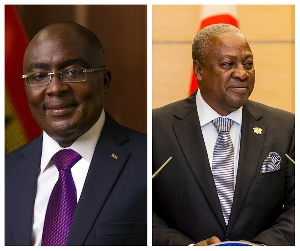 Both Mahama (R) and Dr Bawumia are being credited for the implementation of the Ghana.gov plaform
Both Mahama (R) and Dr Bawumia are being credited for the implementation of the Ghana.gov plaform
The Government of Ghana has reacted to assertions by proponents of the opposition National Democratic Congress (NDC) that the administration of former President John Dramani Mahama started the Ghana.gov platform it is implementing.
Some members of the NDC refuted the claim by Vice President Dr. Mahamudu Bawumia that the Ghana.gov platform was started by the Nana Addo Dankwa Akufo-Addo government, stating that the platform is an alteration of the e-Services platform started by former President John Mahama.
Speaking at a press conference in Accra on Sunday, February 18, 2024, the Minister of Communications and Digitalization, Ursula Owusu-Ekuful, refuted the suggestion by the NDC members.
According to her, the e-Services platform and ghana.gov are two different things.
"The e-Services platform was deployed in 2012 under the e-Ghana project as a pilot to produce an e-Government Portal to provide relevant government services to citizens and businesses. It had a services component and a payment component.
"The e-Services platform was developed by Messrs IPMC at a total cost of about US$547,000 and was then integrated with an e-Payment platform in 2014 to enable online payment for transactions. The e-Payment Platform was developed by Messrs AYA Technologies at a total cost of US$267,000. This was exclusive of annual software licensing fees," the minister explained.
She added that the Akufo-Addo government entered into a partnership with "a consortium of three local technology firms (Hubtel, express-Pay and IT Consortium) to design, develop, deploy, and manage a one-stop-shop online services platform with an integrated payment gateway for the Government of Ghana, known as Ghana.gov."
The minister further explained that there is no way the two platforms can be compared because the Ghana.gov platform being implemented by the Akufo-Addo government is far superior to the e-Services platform started by the Mahama administration.
"There is no comparison between the NDC's e-services portal and the ghana.gov. It will be like comparing chalk and cheese or 'Aboboya' and Mercedes Benz or Tesla," she said.
She added that the current government discontinued using the Mahama e-services portal in 2018 because "it could not reach a broad user base due to inadequate connections in significant parts of the country."
She also said that only a handful of government entities were on the e-Services platform compared to the Ghana.gov platform, which has several hundreds of agencies.
"1507 institutions have been onboarded in three years of operation as against 13 onboarded by the e-Services platform in the same amount of time, with only five active," she said.
The minister added that regarding revenue mobilisation, the Mahama-era platform is nowhere near the one being implemented now.
"One of the most compelling indicators of the platform's success lies in its remarkable revenue collection figures. Currently, Ghana.gov has facilitated the collection of an impressive sum of GHS 210 Billion Ghana cedis," she added.
About the Ghana.gov platform:
Ghana.gov is a digital service and revenue collection platform created to provide a single point of access to the Government of Ghana's services for the public sector.
This is in pursuit of the government's vision of digitising the economy and modernising the way the government pays its bills and collects fees and charges for the benefit of all citizens, residents and visitors.
The service portal seeks to deliver:
1. Processing of all payments and transfers (both electronic and cash) against predefined service flows of each MDA and MMDA.
2. Manage post-payment workflow, customer notification, feedback and service ratings. Thereby enabling the Government of Ghana [to] fulfil its goal of creating a cash-lite economy.
BAI/AE
Meanwhile, watch the most recent episode of The Lowdown GhanaWeb TV below:
Ghana’s leading digital news platform, GhanaWeb, in conjunction with the Korle-Bu Teaching Hospital, is embarking on an aggressive campaign which is geared towards ensuring that parliament passes comprehensive legislation to guide organ harvesting, organ donation, and organ transplantation in the country.